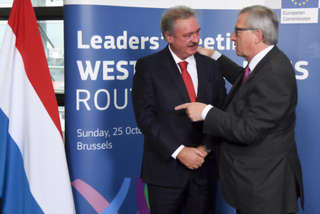On 25 October 2015, an extraordinary meeting on the migrant crisis in Eastern Europe and along the Balkans route was convened in Brussels by the President of the European Commission, Jean-Claude Juncker.
It brought together the Heads of State or Government of Albania, Austria, Bulgaria, Croatia, the former Yugoslav Republic of Macedonia, Germany, Greece, Hungary, Romania, Serbia and Slovenia, as well as the President of the European Council, Donald Tusk, the Luxembourg Presidency of the Council of the EU, represented by Jean Asselborn, the Minister for Foreign and European Affairs and Minister for Immigration and Asylum, and representatives of the United Nations High Commissioner for Refugees (UNHCR), the European Asylum Support Office (EASO) and Frontex. The meeting was devoted to the management of the migrant crisis in order to define operational conclusions which might be implemented immediately.
The Commission had sent to the invited States – eight EU states and three States with a European perspective – and agencies a draft project for actions which needed to be discussed during the meeting. This was placed under the sign of a 'determined and collective cross-border approach based on a European spirit and pragmatic cooperation between national, regional and local authorities'. Most of these proposals were agreed upon and translated into a 17-point action plan.
A tense atmosphere
The meeting started with a tense atmosphere. 'If we don't find a solution today, if we don't do everything we can today, then it is the end of the European Union as such', declared the Slovenian Prime Minister Miro Cerar, whose country has just witnessed the passage of 60,000 migrants in ten days. The Austrian Chancellor, Werner Faymann, expressed an additional concern: 'The decisive point is to protect the EU's external borders together.If we fail, it will be easy for right-wing nationalist forces to say that Europe has failed'.
A 17-point plan of action
At midnight, Jean-Claude Juncker, the German Chancellor, Angela Merkel and the High Commissioner for Refugees, Antonio Guterres, announced the results of the meeting which, according to the President of the Commission, aimed to 'avoid a humanitarian crisis'.
The aim is to provide refugees and migrants along the Western Balkans route with shelter, food and healthcare as soon as possible in preparation for winter.
The aim also is to increase reception capacities in the countries concerned. In this context, Jean-Claude Juncker announced the creation of 30,000 places in Greece up until the end of 2015, 20,000 other places with families supported by the UNHCR, and, finally, 50,000 other places along the route.All of this is designed to contribute to the functioning of the relocation mechanism.
The aim is then to lower the uncontrolled flow of people crossing the borders. Jean-Claude Juncker explained that refugees who do not register will not have any rights.
A permanent exchange of information between countries along the route was agreed and the States participating in the meeting undertook not to proceed with any unilateral action which might have an impact on a neighbouring country. He deemed that, in this way, a controlled and ordered movement of people along the Western Balkans route might be possible.
The deployment of 400 EU border guards and the activation by Slovenia of the Rapid Border Intervention Teams (RABIT) mechanism was announced, as was the management of external borders between Greece and the former Yugoslav Republic of Macedonia in collaboration with Frontex, which will support the registration of refugees and migrants in Greece.
The European Commission is in charge of ensuring the implementation of these commitments on a weekly basis in coordination with the national contact points that will be created.
Jean-Claude Juncker insisted on the fact that closing borders is not a solution, but that Europeans should act together and not against each another.
In her remarks, Chancellor Merkel expressed her hope that the creation of 50,000 additional reception places in Greece would enable the refugee relocation mechanism to get underway. For her, the result of the EU's efforts is divided into four sections: better support for refugees along the route, a qualitative leap with the setting up of five hotspots and the increase in reception capacities in Greece, cooperation between the EU and Turkey on the basis of the joint action plan and cooperation on the readmission of migrants who are not entitled to international protection by third countries, in particular, Afghanistan, Bangladesh, Iraq and Pakistan. She also referred to the Justice and Home Affairs Council (JHA) convened by the Luxembourg Presidency on 9 November 2015.
The position of Jean Asselborn, President of the JHA Council
As President of the Justice and Home Affairs Council (JHA), Jean Asselborn insisted on the fact that the format of this meeting was clearly not that of the Council, but 'a specific composition in an exceptional situation' on the initiative of the Commission. He also declared that he was not happy with the first part of this meeting because some countries had focused on ways of avoiding being faced with refugees, while others referred to the Geneva Convention which does not allow borders to be closed against those who request international protection.
However, the second part of the meeting, which focused on the plan of action, led to the definition of 'some interesting directions' which will provide input for the JHA Council of 9 November. Jean Asselborn highlighted the exchange of information, the agreement with Greece on new reception capacities on the mainland, as well as reception capacities along the route. But the war continues in Syria, he also declared, and it is necessary to negotiate with Turkey so that it plans for the reinforcement of its capacities with regard to refugees in the field of education and the labour market. The Minister also drew attention to the cost of the planned operations.

